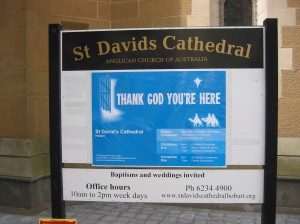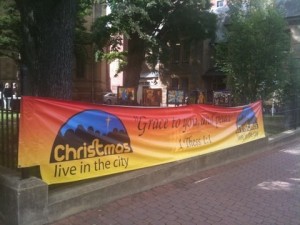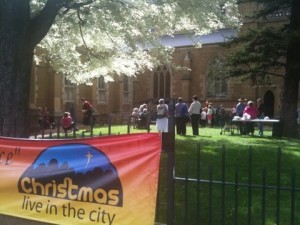I commend this excellent address by Bishop George Leo Thomas, Friday, December 25, 2009 Christmas liturgy brought lasting lesson –
As a newly ordained priest in Seattle, I had eagerly anticipated the celebration of my first Christmas Mass.
The Cathedral was resplendent in holly and greens. The people were decked out in their finery. The choir began the liturgy with “O, Come All Ye Faithful,” when the unexpected happened.
A mentally ill man burst through the main doors, his arms flailing wildly. He shouted loudly and unintelligibly, and approached the sanctuary where I was seated with Archbishop Raymond Hunthausen.
We both sat frozen in our places, uncertain what to do as another unanticipated event unfolded before us.
A middle-aged woman arose from the congregation and quietly approached the distressed man. She reached out her hand to him, and quietly led him to her place in the assembly.
The gentleness of her touch stilled his agitation and quieted his mind.
The people breathed a collective sigh of relief. I shook inside for the rest of the Mass.
In the days following that memorable Christmas liturgy, I came to this conclusion:
God blessed us that morning with the visit of a poor man.
That Christmas liturgy took on a depth and meaning that far exceeded holly, carols and warm Christmas sentiments. The “Word became flesh” in a new and unanticipated way.
Down through the years, beginning with that memorable Christmas liturgy, I have come to understand and embrace Christianity’s deeply held conviction — that there must be meaningful connections between liturgy and life, worship and compassion, prayer and service, faith and forgiveness, love of God and love of neighbor.
Christian worship that does not transform hearts, “open the eyes of the blind” and send parishioners forth in humble service, no matter how well-planned and celebrated, has missed the mark.
Worship done well helps us see every person, no longer with human eyes, but with “the eyes of the heart.”
The Gospel we embrace compels us to stand up and speak an often unpopular and troubling message — that is, in God’s eyes, there are no cast-offs or throwaway people. All are made in the image and likeness of God. All persons have inherent value and worth, from the moment of conception until natural death.
That is why the Catholic Church attempts to speak out consistently and compellingly in the name of the unborn, on behalf of the poor and against assisted suicide. That is why we try to minister to those in prison or on death row, seek immigration reform, eschew armed conflict, work in global solidarity with the world’s needy and serve those on the margins of society.
When we fail to live up to the standard of the Gospel, as does often happen, the Lord is wont to send an unexpected visitor into our midst as He did that Christmas morning, challenging us to live and act in ways that are worthy of the name Christian.
The Most Rev. George Leo Thomas is the bishop of Helena.
This issue so well expressed by Bishop George of the Gospel’s passion for all people, everywhere, is vital in the euthanasia / patient assisted suicide debate. See Assisted dying UK and Fulfillment in suffering?




